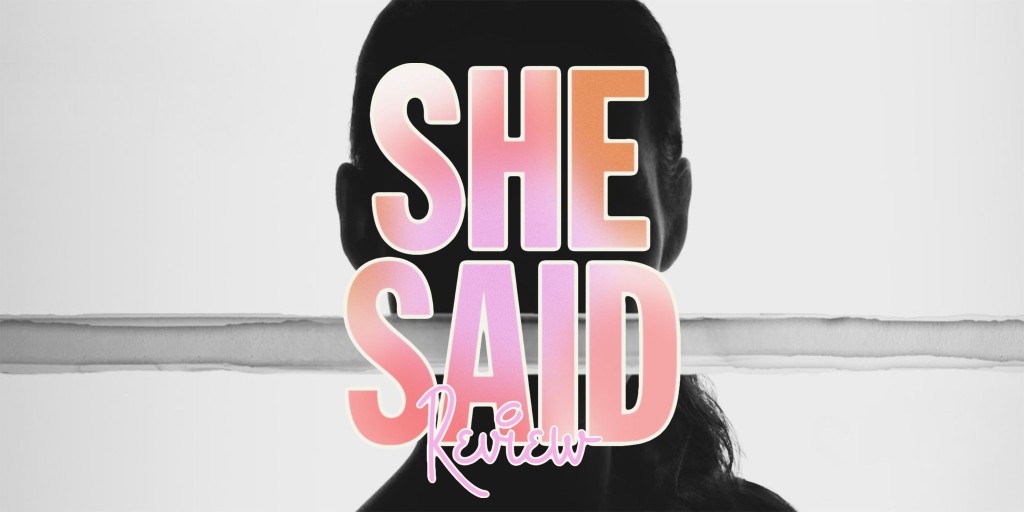She Said makes us believe in the importance of this story – and the movement it sparked – all over again by reminding us of the impacts of these assaults on the women who lived through them.
*This review contains spoilers for She Said.*
Nowadays, most people who pay attention to film or pop culture are aware of Harvey Weinstein, his insanely inappropriate behavior towards women, and his eventual downfall. However, some may not remember the article in the New York Times that took his behavior from being the film industry’s worst-kept secret to something known by millions of people across the world. Maria Schrader’s new film, She Said, illuminates the impressive work that went into the writing of the article by a team of female journalists and the difficult path towards encouraging Weinstein’s victims to talk.
Jodi Kantor and Megan Twohey spent months researching the countless allegations of sexual misconduct against the successful Hollywood producer which stretched back three decades. The victims included household name actresses, production assistants, and employees of Miramax and The Weinstein Company. Their NYT article helped along the #MeToo movement and contributed to Weinstein being brought to court and eventually to prison.
Schrader’s film wisely concentrates on Kantor (Zoe Kazan) and Twohey (Carey Mulligan), in addition to the women that they speak with, rather than focusing on Weinstein himself. Rebecca Lenkiewicz adapted her screenplay from the 2019 book written by the two reporters, which also was titled She Said. Both women are introduced first as characters before Weinstein’s name is ever mentioned, helping us build a personal connection to them as well as their mission.
Kantor is not only a professional journalist who gets easily sucked into the story as soon as she begins her research, but a working, Jewish mother. Meanwhile, Twohey needs some convincing that the story is worth pursuing and is dealing with postpartum depression after the birth of her first child. The film’s honest and sympathetic portrayal of postpartum is one of the things that sets it apart. Seeing a film honestly reckon with it, along with acknowledging the challenges that working mothers face, is incredibly meaningful as it helps to break the stigma around an issue that many women face.
She Said follows the two women reaching out to more and more women as they unfold the story of Weinstein’s abuse and how pervasive and indiscriminate it was. Each woman they contact is given the chance to tell her story, and the way that they present these stories is very respectful, both to the women telling them and to the women in the audience. Each one of the actresses in the film gives an impressive performance, particularly Jennifer Ehle and Samantha Morton. There’s also a surprising but emotional cameo from one of the women involved in the actual story who plays herself (but I wouldn’t dare spoil that for you).
Kazan and Mulligan are both fantastic and play off of each other well. As Jodi, Kazan beautifully coaxes the women that they are interviewing to open up to her, with her reassuring nature showing the audience why they might be willing to. Meanwhile, Mulligan’s Megan is more of a firebrand; she’s excellent at dealing with the pigheaded men who try to get in their way. There’s a scene in which she explodes at a man in a bar, and it’s the perfect encapsulation of a frustration that every woman has felt. She also brilliantly depicts the depression that Megan is dealing with in subtle but nuanced ways, while Kazan empathetically depicts the hardships that accompany being a working mother.
Schrader wisely never shows an assault happening. Instead, we hear the women’s testimony while the visuals show the setting in which it happened, from hotel hallways to offices. Schrader knows that this method is enough of a gut punch to anyone watching and allows these stories to be told while minimizing how triggering it might be to those in the audience who have experienced assault. We have had several female-directed films this year, including Women Talking, that have understood that an assault does not need to be shown onscreen for its impact to be felt. It’s proof that there is something to be said for women telling women’s stories, particularly when they include sensitive topics, because they understand which things are useful to be shown onscreen and which are not.
She Said is impressive on all fronts, from Nicholas Britell’s intense score to Natasha Braier’s unobtrusive cinematography to Hansjörg Weißbrich’s succinct editing. Even the costume and production design bely the care that was put into the film, as they feel realistic to journalists in New York City in the mid-2010s, unlike many depictions of life in New York. Some have criticized the film for not being “flashy,” but Schrader and her team know how to stand back and let the important story that they are telling be the center of attention.
She Said shows the way in which Weinstein tried to put a stop to the article and the fights that the NYT team went through with him and his people. It ends with the publication of the article, and Schrader manages to make the final editing of it one of the most thrilling scenes of the entire year. Even though we, as the audience, know that the article will be published and women will agree to go on record, we wait with bated breath to see if they will succeed.
Why? Because She Said makes us believe in the importance of this story – and the movement it sparked – all over again by reminding us of the impacts of these assaults on the women who lived through them. The film is sympathetic to the women who felt silenced and unable to stand up to one of the most important men in Hollywood but also stresses the necessity of bringing down Weinstein and other people like him.
Cancel culture is as much of a buzzword as ever these days, though it seems questionable if the men whose wrongdoings are brought into the light even face consequences. Louis C.K. was just nominated for more Grammys, and Brad Pitt is once again in the Oscar conversation for the upcoming Babylon. While Weinstein was eventually brought down, too many wrote that off as the end of the story rather than turning to the other abusers just like him who pervade the industry. She Said asks us once again to ponder the “ocean of wrongdoing” that was at the center of Hollywood for so long and may hopefully remind us that this journey – to ensuring that all people, both men and women, in Hollywood are allowed to pursue their careers freely without encountering assault or harassment – is far from over.
Grade: A+
Oscar Prospects:
Likely: Best Picture, Best Adapted Screenplay, Best Supporting Actress (Carey Mulligan)
Should be Considered: Best Director, Best Actress (Zoe Kazan), Best Original Score
Where to Watch: In Theaters

Nicole Ackman
she/her @nicoleackman16
Living out her childhood dreams of being a writer, just like Jo March
Favorite Directors: Kenneth Branagh and Greta Gerwig
Sign: Virgo

Leave a comment